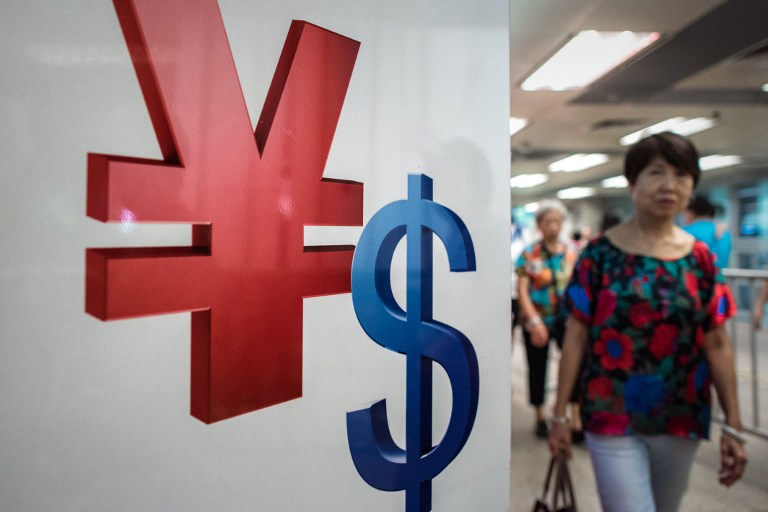
A woman walks past a yuan and a US dollar currency sign in Hong Kong in this file photo. China’s foreign exchange reserves fell by a record $93.9 billion last month, the government said Monday, as Beijing sold dollars to support its own currency following jitters over a sudden devaluation. AFP PHOTO/PHILIPPE LOPEZ
BEIJING—China’s foreign exchange reserves fell by a record $93.9 billion last month, the government said Monday, as Beijing sold dollars to support its own currency following jitters over a sudden devaluation.
The currency hoard declined by $93.9 billion to reach $3.56 trillion at the end of August, the State Administration of Foreign Exchange (SAFE) said on its website, showing the cost of China’s efforts to prop up the yuan.
The fall was larger than expected, with a Bloomberg News survey of economists giving a median forecast for the reserves of $3.58 trillion.
August was the fourth consecutive month reserves fell, according to SAFE data, and their lowest level since August 2013. In previous years China’s government bought dollars to slow the appreciation of yuan.
But the foreign currency reserves remain by far the world’s largest.
China lowered the yuan’s central rate against the US dollar by five percent in a week last month, a move which added to turmoil in global markets where traders worried the move signaled weakness in China’s economy, a key driver of world growth.
Policy makers then changed tack, seeking to stabilize the currency.
“If the central bank continues its intervention, China’s foreign exchange reserves will continue to shrink— the heavier the intervention, the deeper the fall,” Li Miaoxian, a Beijing-based analyst at Bocom International Holdings told Bloomberg.
China on Monday lowered last year’s economic growth figure to 7.3 percent after concerns about slowing expansion caused global market havoc, but said its own stock exchanges are stabilizing following “bubbles” and painful corrections.
The new number remains the lowest since 1990, when growth plummeted to 3.9 percent.
After decades of double-digit expansion, authorities are trying to pull off a tricky rebalancing—from an investment- and export-led economic model to one where domestic consumer demand drives slower but more sustainable growth.
Chinese policy makers at the weekend attempted to ease fears during a G20 summit meeting, saying the economy was broadly stable.